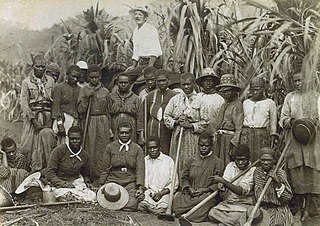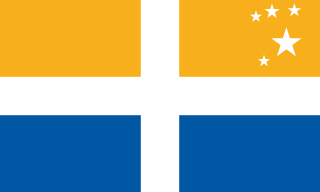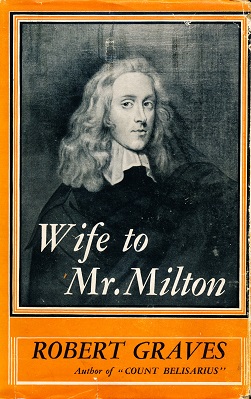
The Channel Islands are an archipelago in the English Channel, off the French coast of Normandy. They include two Crown Dependencies: the Bailiwick of Jersey, which is the largest of the islands; and the Bailiwick of Guernsey, consisting of Guernsey, Alderney, Sark, Herm and some smaller islands. They are considered the remnants of the Duchy of Normandy and, although they are not part of the United Kingdom, the UK is responsible for the defence and international relations of the islands. The Crown dependencies are not members of the Commonwealth of Nations, nor have they ever been in the European Union. They have a total population of about 171,916, and the bailiwicks' capitals, Saint Helier and Saint Peter Port, have populations of 33,500 and 18,207, respectively.

Solomon Islands is a sovereign state in the Melanesia subregion of Oceania in the western Pacific Ocean. This page is about the history of the nation state rather than the broader geographical area of the Solomon Islands archipelago, which covers both Solomon Islands and Bougainville Island, a province of Papua New Guinea. For the history of the archipelago not covered here refer to the former administration of the British Solomon Islands Protectorate, the North Solomon Islands and the History of Bougainville.

Captain Robert von Ranke Graves was an English poet, historical novelist and critic. His father was Alfred Perceval Graves, a celebrated Irish poet and figure in the Gaelic revival; they were both Celticists and students of Irish mythology. Graves produced more than 140 works in his lifetime. His poems, his translations and innovative analysis of the Greek myths, his memoir of his early life—including his role in World War I—Good-Bye to All That, and his speculative study of poetic inspiration The White Goddess have never been out of print. He is also a renowned short story writer, with stories such as "The Tenement" still being popular today.

Mallorca, or Majorca, is the largest island in the Balearic Islands, which are part of Spain, and the seventh largest island in the Mediterranean Sea.

Guadalcanal is the principal island in Guadalcanal Province of Solomon Islands, located in the south-western Pacific, northeast of Australia. It is the largest island in the Solomon Islands by area, and the second by population. The island is mainly covered in dense tropical rainforest and has a mountainous hinterland.

Barra is an island in the Outer Hebrides, Scotland, and the second southernmost inhabited island there, after the adjacent island of Vatersay to which it is connected by a short causeway. The island is named after Saint Finbarr of Cork.

Solomon Islands is an island country consisting of six major islands and over 900 smaller islands in Oceania, to the east of Papua New Guinea and north-west of Vanuatu. It has a land area of 28,400 square kilometres (11,000 sq mi), and a population of approx. 700,000. Its capital, Honiara, is located on the largest island, Guadalcanal. The country takes its name from the wider area of the Solomon Islands (archipelago), which is a collection of Melanesian islands that also includes the Autonomous Region of Bougainville, but excludes the Santa Cruz Islands.

Kanakas were workers from various Pacific Islands employed in British colonies, such as British Columbia (Canada), Fiji, Solomon Islands, Vanuatu, Papua New Guinea, and Queensland (Australia) in the 19th and early 20th centuries. They also worked in California and Chile.

Christopher Priest is a British novelist and science fiction writer. His works include Fugue for a Darkening Island, The Inverted World, The Affirmation, The Glamour, The Prestige, and The Separation.

Álvaro de Mendaña y Neira was a Spanish navigator and discoverer, best known for two of the earliest recorded expeditions across the Pacific in 1567 and 1595. His voyages led to the discovery of the Marquesas, Cook Islands and Solomons among other archipelagos. Born in Congosto, in El Bierzo Region (León), he was the nephew of Lope García de Castro, viceroy of Peru.
RAN is an Australian television program that aired on SBS on 5 January 2006. The series was filmed entirely on Masig Island in the tropical Torres Strait north of the Cape York Peninsula, the northernmost part of Australia, and the border with Papua New Guinea.

Santa Isabel Island is the longest in Solomon Islands, the third largest in terms of surface area, and the largest in the group of islands in Isabel Province.
Biuku Gasa and Eroni Kumana were Solomon Islanders of Melanesian descent, who found John F. Kennedy and his surviving PT-109 crew following the boat's collision with the Japanese destroyer Amagiri near Plum Pudding Island on 1 August 1943. They were from the Western Province of the Solomon Islands.

The Isles of Scilly is an archipelago off the southwestern tip of Cornwall, England. One of the islands, St Agnes, is the most southerly point in Britain, being over four miles further south than the most southerly point of the British mainland at Lizard Point.
Marguerite de La Rocque de Roberval was a French noblewoman who spent some years marooned on the Île des Démons while on her way to New France (Quebec). She became well known after her subsequent rescue and return to France; her story was recounted in the Heptaméron by Queen Marguerite of Navarre, and in later histories by François de Belleforest and André Thévet. Her story has been retold many times since 1560.
Cuban-Pacific relations are diplomatic, economic, cultural and other relations between the Republic of Cuba and countries situated in Oceania. In the 2000s, Cuba has been strengthening its relations with Pacific nations, which have, for the most part, responded favourably to Cuban medical aid in particular. The first Cuba-Pacific Islands ministerial meeting was held in September 2008 in Havana, with government members from ten Pacific countries—Kiribati, Tuvalu, Nauru, Solomon Islands, Fiji, Tonga, Vanuatu, Samoa, the Federated States of Micronesia and Papua New Guinea—attending. The meeting was a consolidation rather than a starting point of Cuban-Pacific relations.

The Story of Marie Powell: Wife to Mr. Milton, by Robert Graves, 1943, is a 1943 historical novel based on a true story, the life of the young wife of poet John Milton. Graves tells it from her viewpoint and paints an unflattering portrait of Milton.

Honiara is the capital and largest city of Solomon Islands, situated on the northwestern coast of Guadalcanal. As of 2021, it had a population of 92,344 people. The city is served by Honiara International Airport and the seaport of Point Cruz, and lies along the Kukum Highway.
Isabel Barreto de Castro, was a Spanish sailor and traveler, the first known woman to hold the office of admiral in the history of navigation. She was purportedly the granddaughter of Francisco Barreto, governor of Portuguese India. Isabel Barreto married Alvaro de Mendaña, Spanish navigator, patron of several expeditions to the Pacific Ocean, and European discoverer of the Solomon Islands and the Marquesas Islands.














